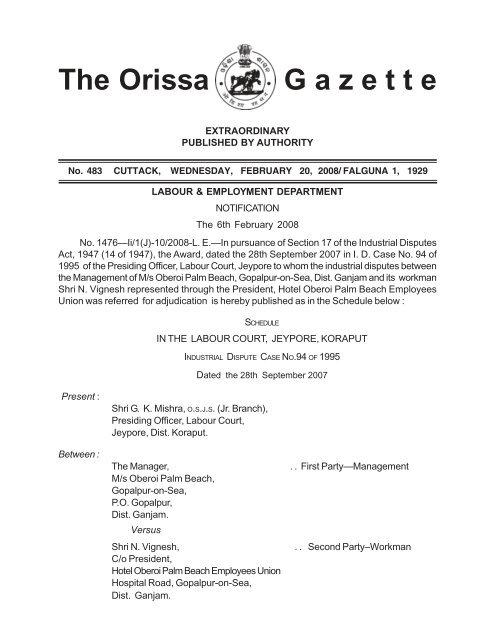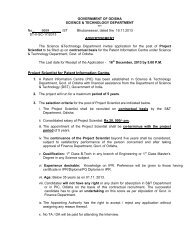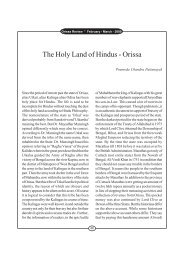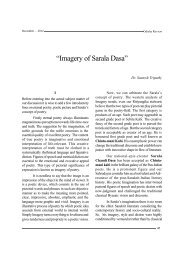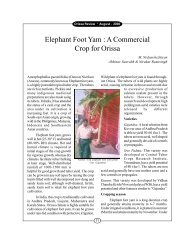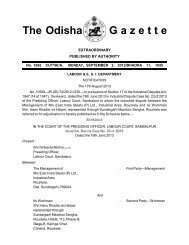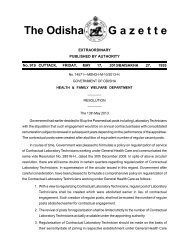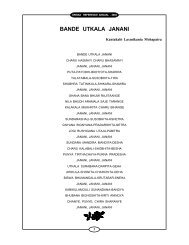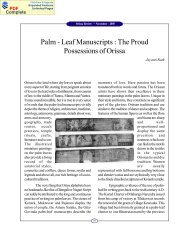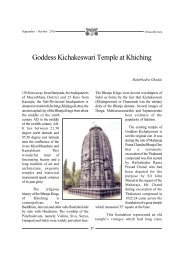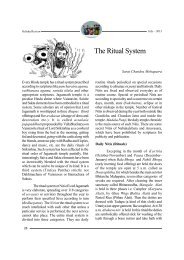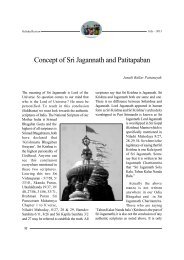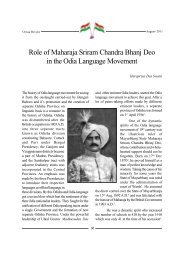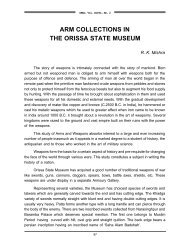2357-Ex-Gazette AWARD Notification (L. & Employment.p65
2357-Ex-Gazette AWARD Notification (L. & Employment.p65
2357-Ex-Gazette AWARD Notification (L. & Employment.p65
You also want an ePaper? Increase the reach of your titles
YUMPU automatically turns print PDFs into web optimized ePapers that Google loves.
The Orissa G a z e t t e<br />
EXTRAORDINARY<br />
PUBLISHED BY AUTHORITY<br />
No. 483 CUTTACK, WEDNESDAY, FEBRUARY 20, 2008/ FALGUNA 1, 1929<br />
LABOUR & EMPLOYMENT DEPARTMENT<br />
NOTIFICATION<br />
The 6th February 2008<br />
No. 1476—Ii/1(J)-10/2008-L. E.—In pursuance of Section 17 of the Industrial Disputes<br />
Act, 1947 (14 of 1947), the Award, dated the 28th September 2007 in I. D. Case No. 94 of<br />
1995 of the Presiding Officer, Labour Court, Jeypore to whom the industrial disputes between<br />
the Management of M/s Oberoi Palm Beach, Gopalpur-on-Sea, Dist. Ganjam and its workman<br />
Shri N. Vignesh represented through the President, Hotel Oberoi Palm Beach Employees<br />
Union was referred for adjudication is hereby published as in the Schedule below :<br />
Present :<br />
Between :<br />
SCHEDULE<br />
IN THE LABOUR COURT, JEYPORE, KORAPUT<br />
INDUSTRIAL DISPUTE CASE NO.94 OF 1995<br />
Dated the 28th September 2007<br />
Shri G. K. Mishra, O.S.J.S. (Jr. Branch),<br />
Presiding Officer, Labour Court,<br />
Jeypore, Dist. Koraput.<br />
The Manager, . . First Party—Management<br />
M/s Oberoi Palm Beach,<br />
Gopalpur-on-Sea,<br />
P.O. Gopalpur,<br />
Dist. Ganjam.<br />
Versus<br />
Shri N. Vignesh, . . Second Party–Workman<br />
C/o President,<br />
Hotel Oberoi Palm Beach Employees Union<br />
Hospital Road, Gopalpur-on-Sea,<br />
Dist. Ganjam.
Under Sections 10 and 12 of the Industrial Disputes Act, 1947.<br />
Appearances :<br />
2<br />
Shri R. Venu Gopal Rao, Advocate . . For the Management<br />
Shri Kalu Panda . . For the Workman<br />
Date of Argument .. 11-9-2007<br />
Date of Award .. 28-9-2007<br />
<strong>AWARD</strong><br />
The Government of Orissa in the Labour & <strong>Employment</strong> Department in exercise of the<br />
powers conferred upon them under sub-section (5) of Section 12, read with clause (d) of<br />
sub-section (1) of Section 10 of the Industrial Disputes Act, 1947 (14 of 1947), have referred<br />
the following disputes vide their Order No. 11843(5), dated the 4th September 1995 for<br />
adjudication of the following disputes :—<br />
SCHEDULE<br />
“Whether the action of the management of M/s The Oberoi Palm Beach, Gopalpur-on-Sea,<br />
Dist. Ganjam is justified in dismissing Shri N. Vignesh, Gardner from his services<br />
with effect from the 10th February 1994 vide Order, dated the 9th February 1994 ?<br />
If not, to what relief Shri N. Vignesh is entitled ? ”<br />
2. This is a case originated out of the reference submitted by the Government for<br />
determination of the validity and justifiability of the act of dismissal entertained by the<br />
management in respect of the workman coupled with the determination of any relief to be<br />
granted inconsequence to such determination.<br />
3. The facts in epitome may be succinctly described in favour of the workman that, the<br />
workman though engaged as a regular employee, A Gardner, under the management was<br />
consequently dismissed by the management without complying the norms of natural justice in<br />
the form of resorting to any domestic enquiry, taking on vexatious aspertion of misconduct.<br />
The workman challenging the illegality of dismissal sought for reinstatement and full back<br />
wages.<br />
4. The management, on the other hand, traversing the entire assertions put forth by the<br />
workman unfurled contention inter alia that, the workman being actively involved in malicious<br />
prosecution against the management and having viciously tarnished the code of discipline by<br />
involving in illegal strike espousing the cause of others as well as defaulted in performing<br />
proper duties as ordained affecting the efficiency and improvement of the productivity, there<br />
was no alternative than to entailing imposition of punishment of dismissal after adequate<br />
opportunity being offered to the workman. The order of dismissal being justified as well as<br />
plausible, the claim of the workman for reinstatement with full back wages should be jettisoned<br />
on the ground of closure of the establishment.
3<br />
5. The allegation of misconduct principally enjoined the management to take a strongest<br />
decision of imposing extreme punishment of dismissal without resorting to any domestic<br />
enquiry inconsonance with the certified standing order formulated basing upon the agreement<br />
between the management and the employees with the independence of the principle of<br />
lassez faireo governing the relationship between the employer and employee, an employer<br />
cannot be dismissed or discharged an employee, how indisciplined, undesireable or unwanted<br />
he may be. The current Labour Legislation, Judicial pronouncement which have for their<br />
objectives, the amelioration of the lot and the betterment of the service condition of the<br />
working class, have to a great extent, restricted the rights of the employer and secured to the<br />
corresponding extent the job security of a workman. The principles and procedure relating to<br />
the disciplinary action are properly embodied in the standing order of the service rule of an<br />
establishment basing upon the enunciation of the principles of natural justice. The applicability<br />
of the principles of natural justice is not a rule of thumb or straight jacket formula as an abstract<br />
proposition of law. It depends upon the facts of the case, nature of the enquiry and the effect<br />
of the order on the right of the person and attendant circumstances. Reliance has been placed<br />
in a decision rendered by our Hon’ble Supreme Court in Ratanlal Sharma Vrs. Managing<br />
Committee (1993) 4-S.C.C. (10) and Maharastra State Board of Secondary and Higher<br />
Education Vrs. K.S. Gandhi (1991, 2-S.C.C. 716). The aim of the rules of natural justice is to<br />
secure justice or to put it negatively to prevent miscarriage of justic. The rules can operate<br />
only in areas not covered by any law validly made. They do not supplant the law of the land, but<br />
supplement it. Reliance has been placed in a decision rendered by our Hon’ble Supreme<br />
Court R. S. Naik Vrs. Union of India A.I.R. 1994 S.C. 1558. Rules of natural justice are not<br />
embodied rules, nor can they be elevated to the position of Fundamental Rights. The width<br />
and amplitude and the manner of exercise of the power conferred on the authority to act in<br />
accordance with the principles of natural justice, depends upon the circumstances of each<br />
case. Reliance has been place in a decision rendered in by our Hon’ble Apex Court in Union<br />
of India Vrs. J.N. Sinha (1970, 2-S.C. 458). The principles of natural justice primarily depends<br />
upon taking action which is fair just and reasonable. The compliance of natural justice would<br />
not mean a fullfledged departmental enquiry.A limited enquiry as to whether the employee<br />
concerned has sufficient explanation as to be conduct shown to be impinged. For that, the<br />
action of the management should be fair, reasonable and just. Reliance has been placed in a<br />
decision rendered in our Hon’ble Supreme Court in Syndicate Bank Vrs. General Secretary,<br />
Syndicate Bank Staff Association 2000 L.L.R. 68. The natural justice is always implied into<br />
the certify standing order which confers upon the employer a right to take adverse action<br />
against the employee. Where standing order is to be applied the principles of natural justice<br />
is always to be adhered to for taking any action against the employee.<br />
6. In the instant case, standing orders have been formulated by the management on<br />
basis of the agreement effected between the employees, wherein, it has been laid down that,<br />
for the purpose of commission of any misconduct, the disciplinary authority must resort to a<br />
domestic enquiry for establishing the charge. It becomes crystal clear that, disciplinary
4<br />
proceeding must be initiated for proving any commission of misconduct. Mere issuance of<br />
show cause is not sufficient for establishing the charge of misconduct. The employee must<br />
be given a chance to know the accusation made against him and for explaining the cause<br />
and to defend his case by adducing sufficient evidence. In the instant case no enquiry seems<br />
to have been conducted by the authority concerned through an independent body in order to<br />
substantiate the charges. Although allegations have been made, no charges have been<br />
framed regarding the misconduct,alleged to have been committed. The authority appears to<br />
have conducted preliminary enquiry in a halfhazard manner and purpose of preliminary enquiry<br />
is in order to establish a prima facie charge againt the delinquent. It is only for the purpose<br />
of assertaining the truth of the allegation and not otherwise for punishing any delinquent. The<br />
reasonableness of the charges framed on basis of the preliminary enquiry can only be<br />
determined by resorting to a process of domestic enquiry, which is in relation to the appointment<br />
of enquiry officer, presenting officer, production of documents, examination of witnesses,<br />
recording of evidence in presence of delinquent and supply of enquiry report to the delinquent.<br />
If the enquiry is not conducted, which is essential condition to the legality of the disciplinary<br />
order, then the action taken by the authority would be an illegality. The Industrial Adjudication<br />
always insists on proper enquiry, which must be fair and reasonable for enquiry into any<br />
misconduct.<br />
7. The management basically took the view that, the workman always involved in illegal<br />
strike and also giving co-operation to other person involved in the strike which purely impinged<br />
the disciplinary order of the establishment and on the vexatious of allegations presented<br />
against the management. Those allegations are the part of misconduct embodied in the<br />
standing order. That does not mean that, the allegation of misconducts are sufficiently proved,<br />
automatically without adjudging the genuineness of the allegations. The right of the employee<br />
cannot be limited to the extent of confining himself to the duty. He can have the right to strike<br />
in order to press their demands without snapping the relationship of employer and employees.<br />
It is equally well settled that, the work of the establishment should not be paralised and brought<br />
to a standstill by an illegal strike. A worker cannot always be dismissed for joining a strike<br />
which is not illegal, but simply unjustified. In such cases, in absence of any evidence to show<br />
that the workman concerned were guilty of violence during the strike, the action of dismissal<br />
cannot be sustained and the dismissal order can be effected, if the strike is not bona fide and<br />
it is for extraneous consideration not only with a view to betterment of the condition of the<br />
labourer. Reliance has been placed in a decision rendered by our Hon’ble Supreme Court in<br />
Oriental Textile Mill Vrs. Labour Court (1971, II LLJ S.C. 505). The question whether the<br />
strike was justified or not is a question of fact and further whether the strike is illegal or not is<br />
a question of law is to be determined by way of extensive domestic enquiry. The workman<br />
emphatically replied to the allegation made by the management taking the fact that, at the<br />
time of allegation made he was on leave due to off day for which unnecessary allegation have<br />
been made to harass him. On the date when the workman was alleged to be participating in<br />
the ‘dharana’ in front of the Labour Office was declared was a holiday. It had no connection
5<br />
with the disciplinary order of the establishment. The management has not justified whether<br />
the dharana launched by the Union was justified or not and whether the same was entertained<br />
by the employees for the purpose of improvement of the service condition. That required<br />
some materials particular to be produced by the employees for justifying the legality of the<br />
strike and putting of batches in support of such strike. Unless an enquiry is made the justifiability<br />
of strike and their involvement thereto cannot be ascertained for construing an act of<br />
misconduct.<br />
8. Another allegation has been made about the vexelity prosecution filed against the<br />
management. The allegation presented by the workman for unlawful restraint made before<br />
the Court by the workman was ended in acquittal of the management for which a show cause<br />
was issued to the workman by the management for such malicious prosecution. The acquittal<br />
in the Criminal Case does not itself automatically connote that the charge have been nullified.<br />
This Criminal Case has no relivancy to any misconduct to be proved departmentally which<br />
requires fresh evidence to be collected for assessment of misconduct. The workman having<br />
denied the charges of misconduct for filing the case on the point that, the management has<br />
truly misbehaved with filthy language inside the chamber for which a Criminal Case was filed,<br />
it is the bounden duty of the authority to dislodge his veracity by adducing materials against<br />
him. Unless, contradiction of allegations are resolved by way of enquiry, misconduct cannot<br />
be attributed with against the workman. Disciplinary proceeding has got special significance<br />
than the Criminal proceeding. The management appears to have not taken any due regard<br />
to follow the natural justice by giving a chance or opportunity to the workman for justifying his<br />
act. The assessment of the plea purely on the discretion of the authority. If on proper enquiry<br />
it is established that, there is semblance of evidence then nothing can debar the authority to<br />
impose any punishment. The workman having not been provided any opportunity for rebutting<br />
the allegations by adducing evidence, it cannot be said that, the act of the authority is fair, just<br />
and reasonable.Due to the non-compliance of natural justice and fair play in light of the<br />
standing order it can be said that, the act of the management is purely illegal and unjustified.<br />
9. It is very much consequous that, no enquiry has been conducted by the management.<br />
There is no universal rule that, before taking any adverse action enquiry must be conducted.<br />
It is option lies with the management to first impose punishment by way of dismissal, discharge<br />
or otherwise, but he will have to justify the order before the Tribunal or the Labour Court by<br />
adducing sufficient evidence. Reliance has been placed in a decision rendered in our Hon’ble<br />
Supreme Court in Delhi Cloth & General Mills Co. Ltd. Vrs. L. B. Singh (1972-1 LLJ-180<br />
S.C.). In such cases the Tribunal would have jurisdiction to go into the facts and the employers<br />
would have to satisfy it on the genuineness of the order of dismissal A. clear picture has<br />
been indicated by our Hon’ble Supreme Court in Karnataka State Road Transport Corporation<br />
Vrs. Srimati Laxmi Devamma AIR 2001 S.C. 2090, regarding the formalities to be maintained<br />
by the management for adducing evidence at the stage properly required for justifying the<br />
order of dismissal. If the right of the management to adduce evidence is exercised then it is<br />
bounden duty on his part to reflect the plea in the written statement in counter to the allegation
6<br />
of the workman in respect of the illegality of the order, so that, the workman will have a chance<br />
accrued in his favour for preparation of giving rebuttal evidence. The right of the management<br />
in addition to the admission of the order passed which will be alternatively prayed for<br />
consideration of the legality of the order by taking evidence during the couse of hearing. If the<br />
order of the dismissal is found to be unjustified and illegal. An embargo has been put for not<br />
directly adducing evidence without taking plea at the very inception of the commencement of<br />
the proceeding. It was restricted for the purpose of avoiding protracted litigation on the clue<br />
of adducing fresh evidence. If the Court is found the enquiry to be illegal as well as defective,<br />
the right can be invoked or exercised for adducing evidence in order to justify the order of<br />
dismissal and in that matter his right cannot be negatived by the Labour Court and permission<br />
shall have to be accorded to the management for exercising his option of adducing evidence.<br />
The workman will be given a chance to furnish rebatal evidence. Unless such right is exercise<br />
at the very threshold, the management cannot be permitted to leave any additional evidence<br />
for justifying his order.<br />
10. In the instant case the management appears to have not pleaded anything to justify<br />
his order of dismissal by way of adducing additional evidence. Nor has drawn the attention of<br />
the Court to emphasize on the adjudication of preliminary issue on the matter of justifiability<br />
of the order. There was no scope for the Court to preliminarily hold about the illegality of the<br />
order so as to pave the way for the management to adduce additional evidence. Though the<br />
management applied for adducing additional evidence at bilated stage that the midst of<br />
2006, but the right has not been exercised to lead evidence though permitted by the Court.<br />
Even though permitted to lead evidence it would not be sufficient if other party is properly<br />
informed by way of issuing notice to adduce evidence in contra. Moreover, no evidence has<br />
been led for justifying the order of the dismissal. Where the order has been held to be illegal<br />
and unjustified on basis of the defective and no enquiry and there being no evidence justifying<br />
the cause of legality of the order on the part of the management, it can be cumulatively<br />
deduced that, the illegality of the order of dismissal hold by the Court remain unchallenged<br />
and considered to be quite sustainable in the eye of law.<br />
11. The result and effect of the illegal termination will automatically provides a scope for<br />
granting relief of reinstatement and full back wages, but there is no universal application or<br />
straight jacket formula for implementation of the norm. The norm due to passage of time<br />
during globalisation of economy, free trade, emergence of liberalisation and industrial<br />
competition, has been changed with the application of pragmatic approached.In view of the<br />
matter, back wages would not be granted automatically which depends upon the facts and<br />
circumstances of the case. Reliance has been placed in a decision rendered by our Hon’ble<br />
Supreme Court in Bansidhar Vrs. State of Rajasthan 2007 (112 F.L.R. 687) and General<br />
Manager, Haryana Road Ways Vrs. Rudhan Singh 2005 S.C.C. 591. Consideration of length<br />
of service rendered by the workman, the qualification passed by him, the age and other<br />
similar circumstances may be taken into consideration for granting order of back wages as<br />
has been propounded in Municipal Council, Sujanpur Vrs. Surinder Kumar 2006
7<br />
(110 F.L.R. 198 S.C.). An innovative concept was involved by our Hon’ble Supreme Court for<br />
determination of the applicability of the back wages. The Hon’ble Supreme Court in N.U.L.R.<br />
Mills Unit of N.T.C. (U.P.) Ltd. Vrs. Shyam Prakash Shrivastav and another 2007 1 S.C.C.<br />
491 has propounded a theory “gainful employment” to be utilise by all Courts in letter and<br />
spirit before granting any back wages. The onus specially lies on the workman to established<br />
the facts that, during the course of the dismissal he has not gainfully employed as has been<br />
propounded in Rudhan Singh Case (Supra) 2005 S.C.C. 591, and the claim must have to be<br />
reflected initially in the claim statement. Otherwise he would not be entitled for the back wages.<br />
The workman has never pointed out anything that, he was not gainfully employed during the<br />
period of dismissal, so the order of back wages cannot be given effect to.<br />
12. The workman though employed was a Gardner in regular form under the management<br />
the service is no more required by the management on account of the closure of the<br />
establishment since long. There being no vacancy accrued consequent upon the closure of<br />
the establishment except few for it’s maintainance. In such contingency it is not possible to<br />
grant reinstatement except awarding of compensation as deemed proper for the service<br />
rendered by the workman. In such situation the justice would be best subserved if a long sum<br />
amount of Rs. 75,000 is paid to the workman.The management having dismissed the workman<br />
basing upon no enquiry he is liable to pay the aforesaid compensation amount, fixed for the<br />
purpose.<br />
The reference is answered accordingly.<br />
ORDER<br />
The Award is passed in favour of the workman on contest. The management is directed<br />
to pay the compensation amount of Rs. 75,000 to the workman within six months, otherwise<br />
he be at liberty to take shelter of the appropriate authority for realisation of the aforesaid<br />
amount..<br />
Dictated and corrected by me.<br />
G. K. MISHRA G. K. MISHRA<br />
28-9-2007 28-9-2007<br />
Presiding Officer Presiding Officer<br />
Labour Court Labour Court<br />
Jeypore Jeypore<br />
By order of the Governor<br />
K. TRIPATHY<br />
Under-Secretary to Government<br />
Printed and published by the Director, Printing, Stationery and Publication, Orissa, Cuttack-10<br />
<strong>Ex</strong>. Gaz. <strong>2357</strong>–193+11


